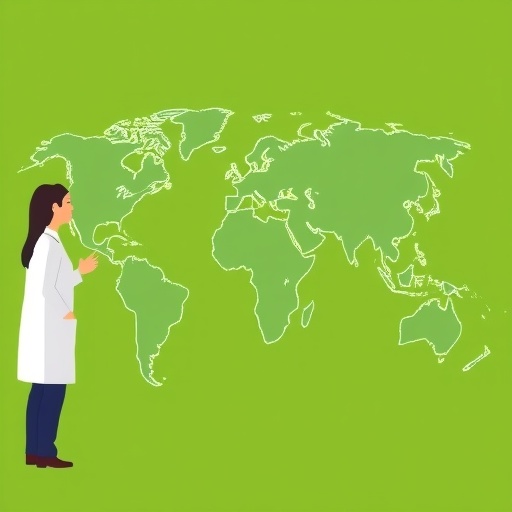In an increasingly interconnected world, the role of physicians is evolving. Future doctors are expected not only to treat illnesses but also to embrace global citizenship, which involves a commitment to social and ethical responsibilities that extend beyond local borders. A recent investigation conducted by Ş. Erden, İ. Gönüllü, and A. Keçeci addresses this pressing concern. The focus of their study is to evaluate the readiness of medical students to step into this role as global citizens, specifically examining their tendencies toward social responsibility.
Globalization has shifted the landscape of medicine, introducing complexities that require a deeper understanding of social contexts, cultural sensitivities, and ethical dilemmas. The study, set to be published in BMC Medical Education, seeks to assess whether medical students are prepared to navigate these challenges. The researchers meticulously designed a survey-based study to gauge the students’ perceptions and commitments to global citizenship amidst their medical education.
The conceptual framework of the study revolves around key competencies that are essential for global citizenship. These include an understanding of social determinants of health, an awareness of global health issues, and the ability to practice cultural humility. By employing a comprehensive methodology, the researchers aimed to establish a baseline of social responsibility tendencies among medical students, which could inform curricula and educational approaches.
What stands out in this research is the acknowledgment that the journey toward becoming a physician is not solely about acquiring knowledge and technical skills. It necessitates a transformation in mindset, which includes fostering empathy and a sense of responsibility toward marginalized populations worldwide. The findings are anticipated to spark conversations about the integration of global health topics into medical curricula, emphasizing the importance of preparing future physicians for a globalized world.
Participants in the study were drawn from multiple medical schools, which enriched the diversity of perspectives and experiences gathered. The varied backgrounds of the students provided the researchers with valuable insights into how cultural context influences one’s commitment to social responsibility. As the study unfolds, the use of quantitative and qualitative analysis will shed light on the nuances of these tendencies and help in formulating actionable recommendations.
An important aspect of the research is its implication for faculty and policymakers within medical education. By highlighting areas where students feel less prepared, the study can guide curriculum developers in creating targeted programs that address these gaps. This not only benefits the students but also enhances the quality of care they provide in their future practices. Such initiatives could include workshops, community engagement projects, and partnerships with global health organizations, all designed to strengthen the social responsibility framework.
Furthermore, the analysis of the students’ attitudes towards global health issues reveals a potential disconnect between theoretical understanding and practical application. While many students may express a desire to contribute positively to global health, the reality of enacting change on a macro level can be daunting. This study aims to bridge that gap by equipping future physicians with the tools necessary to effectively engage in social justice initiatives.
The research also delves into the ethical dimensions that accompany global citizenship in medicine. Medical students are confronted with dilemmas that require not only clinical knowledge but ethical reasoning as well. By exploring these ethical frameworks, the study seeks to foster critical thinking skills that encourage students to advocate for policies that promote health equity and access to care on a global scale.
In a world where health disparities are rampant, the role of medical professionals as advocates for change is more important than ever. The findings of this study could potentially serve as a call to action for medical schools to prioritize training that emphasizes social accountability and responsibility. As future healthcare providers, the challenge lies in ensuring that these ideals are not merely theoretical but are manifested in practice.
Moreover, the interplay between personal values and professional responsibilities is a theme that warrants further exploration. As medical students grapple with their identities and roles in society, understanding how personal experiences shape their commitment to social justice can provide valuable insights. This research aims to initiate discussions around the personal and professional identity of medical students as they prepare to enter a complex healthcare landscape.
Overall, the upcoming publication by Erden, Gönüllü, and Keçeci stands to make significant contributions to the discourse surrounding medical education and global citizenship. It reinforces the notion that future physicians must be prepared not only to treat patients but also to understand and engage with the broader societal factors that impact health outcomes. The study’s implications extend beyond academia, potentially reshaping policies and practices in healthcare systems worldwide.
As we await the publication of this pivotal study, it is clear that the commitment to global citizenship in medicine is a journey that requires dedication, introspection, and a strong ethical foundation. The medical community must embrace this challenge, ensuring that future physicians are not only skilled practitioners but also informed, compassionate advocates for social responsibility.
Subject of Research: Readiness of medical students to be global citizens and their social responsibility tendencies.
Article Title: Are future physicians ready to be global citizens?: social responsibility tendencies of medical students.
Article References:
Erden, Ş., Gönüllü, İ. & Keçeci, A. Are future physicians ready to be global citizens?: social responsibility tendencies of medical students.
BMC Med Educ 25, 1394 (2025). https://doi.org/10.1186/s12909-025-07907-z
Image Credits: AI Generated
DOI: 10.1186/s12909-025-07907-z
Keywords: Global citizenship, medical education, social responsibility, healthcare disparities, ethical dimensions, medical curricula, cultural humility.




